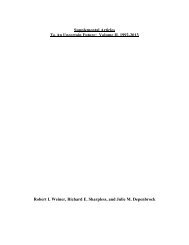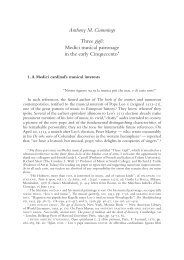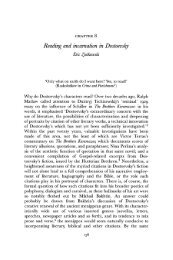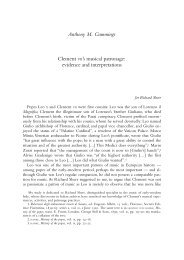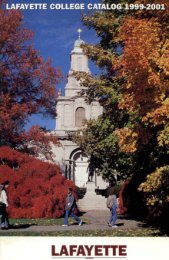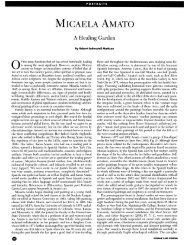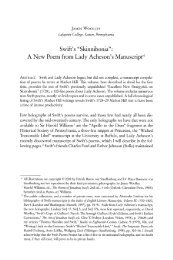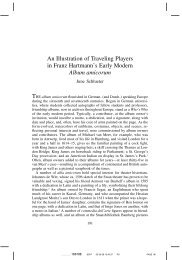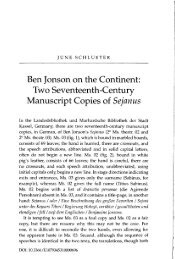Between Religion and Literature: Mircea Eliade ... - Lafayette College
Between Religion and Literature: Mircea Eliade ... - Lafayette College
Between Religion and Literature: Mircea Eliade ... - Lafayette College
You also want an ePaper? Increase the reach of your titles
YUMPU automatically turns print PDFs into web optimized ePapers that Google loves.
<strong>Eliade</strong> <strong>and</strong> Frye<br />
embedded in religion, magic, <strong>and</strong> social ceremonies.""85 Even when reli-<br />
gion <strong>and</strong> literature differentiate, the two perform analogous tasks: "Liter-<br />
ature gives us an experience that stretches us vertically to the heights <strong>and</strong><br />
depths of what the human mind can conceive, to what corresponds to the<br />
conceptions of heaven <strong>and</strong> hell in religion."86 For this reason, Frye can<br />
construe literature in quasi-religious terms as "a human apocalypse, man's<br />
revelation to man" <strong>and</strong> criticism as "the awareness of that revelation, the<br />
last judgment of mankind.""87<br />
Despite his acknowledgment of the interpenetration <strong>and</strong> correspondences<br />
between the religious <strong>and</strong> the literary world, Frye differs from<br />
<strong>Eliade</strong> insofar as he forbids criticism as a "science" to recognize literature<br />
per se as having a religious or sacred dimension. Frye disapproves of those<br />
"critics who enjoy making religious, anti-religious, or political campaigns<br />
with toy soldiers labelled 'Milton' or 'Shelley."'88 He construes literature,<br />
in contrast to religion, as "a body of hypothetical creations which is not<br />
necessarily involved in the worlds of truth <strong>and</strong> fact, nor necessarily withdrawn<br />
from them, but which may enter into any kind of relationship to them""89<br />
(emphasis mine). The sharp line he draws between the religious <strong>and</strong> the<br />
literary is illuminated by his discussion of anagogic criticism in the final<br />
section of the Anatomy's second essay. Even in this kind of criticism, which,<br />
unlike literal-descriptive, formal, or mythical criticism, is often found<br />
linked with religion, religion must be seen as coming to the poet qua poet<br />
only to furnish "metaphors for poetry," while the critic qua critic must<br />
treat every religion strictly as "a human hypothesis."90 As one of the<br />
humanities, the study of literature can take only "the human view of the<br />
superhuman": "<strong>Between</strong> religion's 'this is' <strong>and</strong> poetry's 'but suppose this<br />
is,' there must always be some kind of tension, until the possible <strong>and</strong> the<br />
actual meet at infinity.'"91<br />
Another key difference between <strong>Eliade</strong> <strong>and</strong> Frye lies in their opinions<br />
on how the historian of religions <strong>and</strong> the critic should relate to their sub-<br />
jects. At first glance, Frye's suggestion that to analyze a poem properly<br />
the critic must "possess" it so that it ceases to exist "out there" <strong>and</strong> "revives<br />
within him""92 might seem to resemble <strong>Eliade</strong>'s insistence that the historian<br />
of religions should seek both to underst<strong>and</strong> the situation of homo<br />
religiosus "from within" <strong>and</strong> to recognize the sacred through "internal ex-<br />
85 Frye, Educated Imagination (n. 41 above), p. 40.<br />
86 Ibid., p. 101.<br />
87 Ibid., p. 105.<br />
88 Frye, Anatomy (n. 16 above), p. 24.<br />
89 Ibid., pp. 92-93.<br />
90 Ibid., pp. 125, 126.<br />
91 Ibid., pp. 126, 127-28.<br />
92 Frye, Spiritus Mundi, p. 119; cf. Critical Path (n. 18 above), p. 127.<br />
513



